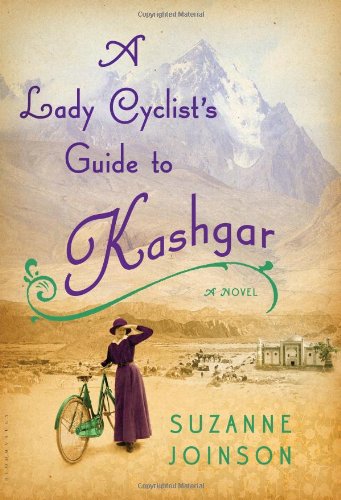[amazon_link id=”1608198111″ target=”_blank” container=”” container_class=”” ] [/amazon_link]Title : A Lady Cyclist’s Guide to Kashgar
[/amazon_link]Title : A Lady Cyclist’s Guide to Kashgar
Author : Suzanne Joinson
Genre : Women’s
Publisher : Bloomsbury
Pages : 384
Rating : 3.5/5
The book has two parallel tracks, each running independently until the later half of the book where we begin to glimpse tenuous links. In the first in 1923, Evangeline has set off for a trip along the Silk Route with sister Elizabeth, and Lizzie’s friend Milicent Frost. Eva is not a believer, unlike Milicent and Lizzie who are filled with missionary zeal, although she pretends to be one to be allowed on the arduous journey. The book starts off by putting us right in with the three who happen to witness and help an 11 year old girl give birth on the road. The young mother dies, but the baby is saved. Unfortunately the local people decide to hold the three foreign-looking women responsible for the death and place them under house arrest.
The baby becomes Eva’s responsibility. As the three women wait for the trial, they negotiate the everyday vagaries of Mohammed’s household with his many wives and their children. Eventually the three rent a house outside the village for themselves. However the villagers are increasingly hostile, their missionary organization has refused to help and Milicent and Lizzie seem to be drowning in deep religious fervor, endangering their survival in Muslim Kashgar. To Eva it seems like she may never be able to make it to England ever again.
The second track is set in modern day London telling us Freida Blaekman’s tale. Tired of her travel and work and unhappy with her personal life, Frieda meets Tayeb, a middle-aged illegal immigrant who lands up on her stoop, seeking shelter. Freida has recently been bequeathed the contents of a cottage from a mysterious Irene Guy, and Tayeb helps her unravel the mystery.
I was looking forward to this book because of its female-centric theme and expected a book similar to Tracy Chevalier’s feminist tales. The allusion to cycling drew me in, with the close connection between cycling for women and the evolution of women’s dress from the corseted gowns to the relatively comfortable pantaloons. Eva takes her bicycle on the journey:
“Why do you want to bring it?” Lizzie asked, but I don’t think I answered her. I did not tell her that it was my shield and my method of escape; or that since the first time I pedaled and felt the freedom of cycling, I’ve known that it is the closest I can get to flying.”
and Freida has found it to be her mode of deliverance :
This was when Frieda had discovered that it was possible to run away on a bike. Cycle, wheels fast, move fast, keep moving, go go go until you are far away . . . Keep riding, riding away. If you cycle fast enough you fly.
Interestingly both women, separated by generations, want to be free, and by inference empowered, and see cycling as a way of achieving it. While this is a well-written book and a decent read, I did not find the prose or the intention as lucid as Chevalier’s. I did find Eva’s situation surreal and her too passive a heroine – she acted, but only under the most trying circumstances. I liked Freida more.
On the plus side the settings are beautifully described, and the village of Kashgar and the surroundings of the three English women come to life in Joinson’s prose. The clash between the cultures and religions is interestingly portrayed. This book does sketch out the travails of women now and then, and their search for independence, and it makes for a thought-provoking, if melancholic read. If you’re looking for a woman’s travelogue (theres a cycle on the cover and it in the title!) with uplifiting notions of feminist belief or action, this is not it. Rather, it takes the “cycling theme” and it’s notional baggage and uses it to tie together the stories of women in two different times. Fans of women’s fiction will be pleased.


I quite enjoyed this book too. However I was the opposite of you. I thought the Frieda story very irrelevant and mostly enjoyed the historical aspect.